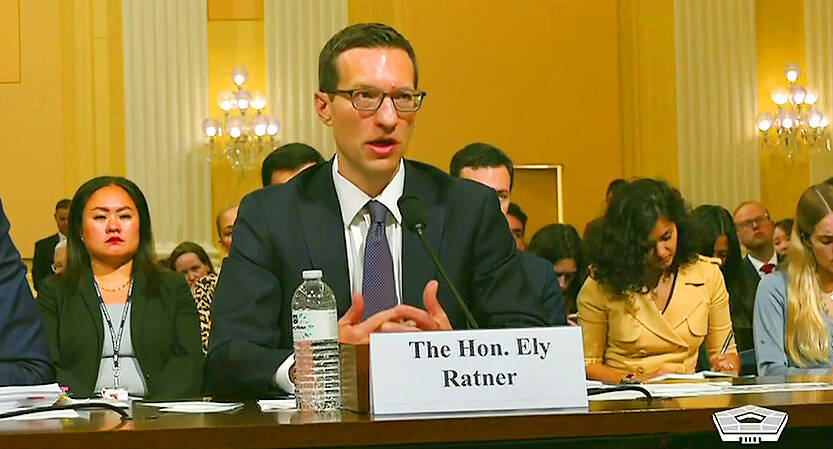Washington will expedite arms sales to Taiwan through various means including the presidential drawdown authority, US Assistant Secretary of Defense for Indo-Pacific Affairs Ely Ratner said on Thursday.
Ratner was speaking at a hearing held by the US House of Representatives’ Select Committee on the Strategic Competition between the US and the Chinese Communist Party to discuss US President Joe Biden’s China strategy.
Asked about the delay in delivering weapons to Taiwan, Ratner said: “What we are facing is not a backlog as is sometimes described, but rather concerns and slowdowns within all of our industrial base.”

Photo: Screen grab from a video on the US Department of Defense’s Web site
It is a systemic problem that is affecting not only Taiwan, but military production in the US defense industrial base, he said.
“We’re doing everything we can to fulfill our commitments under the Taiwan Relations Act [TRA] as quickly as we can” through foreign military sales, presidential drawdown authority and potentially foreign military financing, he said.
As part of the National Defense Authorization Act for Fiscal Year 2023, the US Congress authorized up to US$1 billion of weapons aid for Taiwan using the presidential drawdown authority, which authorizes the president to transfer weapons and services from US stockpiles without congressional approval during an emergency.
The US “will soon provide significant additional security assistance to Taiwan through the presidential drawdown authority that Congress authorized last year,” US Secretary of Defense Lloyd Austin told Congress in May.
“Providing these self-defense capabilities to Taiwan is one of the department’s highest priorities,” Ratner said.
“The TRA has formed the bedrock of peace, stability and deterrence in the Taiwan Strait over the last four decades,” he said.
“We’re absolutely committed to ... meeting our commitments under the Taiwan Relations Act to assist Taiwan to maintain sufficient self-defense capability. We’ll meet those obligations,” US Assistant Secretary of State for East Asian and Pacific Affairs Daniel Kritenbrink told the hearing.
On US-Taiwan economic relations, US Representative Michelle Steel said that the initial trade agreement reached under the US-Taiwan Initiative on 21st-Century Trade, which the US Senate passed on Tuesday, was welcomed, but “it’s still [a] very tiny bit, so we really have to extend that.”
Asking why Taiwan is not included in the Indo-Pacific Economic Framework (IPEF), she said: “Why leave them [Taiwan] out of the IPEF if they are a like-minded, true ally.”
Kritenbrink said that the US is focusing on the 14 partners currently in the IPEF, but reaffirmed Washington’s promise to Taiwan.
“We’re very committed to building our partnership with Taiwan, our very important, robust, but unofficial partnership,” and will continue to do so, he said.
Additional reporting by CNA

AIR SUPPORT: The Ministry of National Defense thanked the US for the delivery, adding that it was an indicator of the White House’s commitment to the Taiwan Relations Act Deputy Minister of National Defense Po Horng-huei (柏鴻輝) and Representative to the US Alexander Yui on Friday attended a delivery ceremony for the first of Taiwan’s long-awaited 66 F-16C/D Block 70 jets at a Lockheed Martin Corp factory in Greenville, South Carolina. “We are so proud to be the global home of the F-16 and to support Taiwan’s air defense capabilities,” US Representative William Timmons wrote on X, alongside a photograph of Taiwanese and US officials at the event. The F-16C/D Block 70 jets Taiwan ordered have the same capabilities as aircraft that had been upgraded to F-16Vs. The batch of Lockheed Martin

GRIDLOCK: The National Fire Agency’s Special Search and Rescue team is on standby to travel to the countries to help out with the rescue effort A powerful earthquake rocked Myanmar and neighboring Thailand yesterday, killing at least three people in Bangkok and burying dozens when a high-rise building under construction collapsed. Footage shared on social media from Myanmar’s second-largest city showed widespread destruction, raising fears that many were trapped under the rubble or killed. The magnitude 7.7 earthquake, with an epicenter near Mandalay in Myanmar, struck at midday and was followed by a strong magnitude 6.4 aftershock. The extent of death, injury and destruction — especially in Myanmar, which is embroiled in a civil war and where information is tightly controlled at the best of times —

Taiwan was ranked the fourth-safest country in the world with a score of 82.9, trailing only Andorra, the United Arab Emirates and Qatar in Numbeo’s Safety Index by Country report. Taiwan’s score improved by 0.1 points compared with last year’s mid-year report, which had Taiwan fourth with a score of 82.8. However, both scores were lower than in last year’s first review, when Taiwan scored 83.3, and are a long way from when Taiwan was named the second-safest country in the world in 2021, scoring 84.8. Taiwan ranked higher than Singapore in ninth with a score of 77.4 and Japan in 10th with

SECURITY RISK: If there is a conflict between China and Taiwan, ‘there would likely be significant consequences to global economic and security interests,’ it said China remains the top military and cyber threat to the US and continues to make progress on capabilities to seize Taiwan, a report by US intelligence agencies said on Tuesday. The report provides an overview of the “collective insights” of top US intelligence agencies about the security threats to the US posed by foreign nations and criminal organizations. In its Annual Threat Assessment, the agencies divided threats facing the US into two broad categories, “nonstate transnational criminals and terrorists” and “major state actors,” with China, Russia, Iran and North Korea named. Of those countries, “China presents the most comprehensive and robust military threat